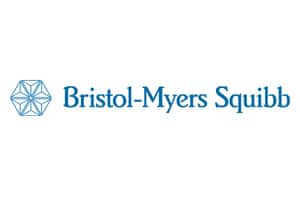
Bristol-Myers Squibb’s Opdivo seems to have hit the buffers as competition in the cancer immunotherapy category continues to ramp up.
In its third-quarter results, BMS revealed that PD-1 checkpoint inhibitor Opdivo (nivolumab) grew just 1% to $1.82bn, with sales slipping 5% in the US, reversing consistent growth since its launch five years ago.
Regardless, BMS group sales rose 6% to $6bn in the quarter – around $100m more than consensus forecasts – as it prepares for its $74bn takeover of Celgene that will dilute Opdivo’s importance to its top-line.
The company’s chief executive Giovanni Caforio (pictured below, left) talked up new trial results for the drug alongside CTLA4 checkpoint inhibitor Yervoy (ipilimumab) in first-line non-small cell lung cancer (NSCLC), a big market currently dominated by Merck & Co’s rival PD-1 drug Keytruda (pembrolizumab).
Earlier this week, Merck reported sales of Keytruda grew almost two-thirds to $3.1bn, fuelled by expanding use in previously-untreated lung cancer. BMS’ chances of revitalising Opdivo’s sales growth could depend on whether the Yervoy combination can start to encroach on that territory .
.
“With the results of both CheckMate-9LA and 227 coupled with the strength of our commercial capability, I feel good about our ability to maximize the opportunity we see in the first-line lung cancer market,” said Caforio on the company’s third-quarter results call.
He said Opdivo/Yervoy’s had better long-term survival than the PD-1 inhibitor/chemo combination – which is driving Keytruda’s growth – and added that the “depth and durability” of responses would help drive adoption if approved.
BMS is a bit like Merck & Co in that its results calls tend to be dominated by its checkpoint inhibitor at the moment, and it too is keen to point to development of its business elsewhere.
Anticoagulant Eliquis (apixaban) did better than predicted with a 22% increase to $1.93bn, and there were also solid gains for arthritis and psoriasis therapy Orencia (abatacept) – up 14% to $767m – and leukaemia drug Sprycel (dasatinib) which brought in $558m, also up 14%.
Caforio also pointed to Celgene’s strong results, which were also reported yesterday and revealed a 16% increase in revenues to $4.5bn fuelled by its blood cancer therapies Revlimid (lenalidomide) and Pomalyst (pomalidomide) which grew 13% to $2.77bn and 29% to $664m, respectively.
Psoriasis therapy Otezla (apremilast) also surged 27% to $547m, but was a mixed blessing as the product will have to be divested as a condition of antitrust approval of the merger with BMS.
“I am pleased with the significant progress we’ve made to bring together two leading innovation companies, united by a shared focus on transforming patient lives through science,” he said.
“We continue to expect to complete the combination…before the end of 2019”.




